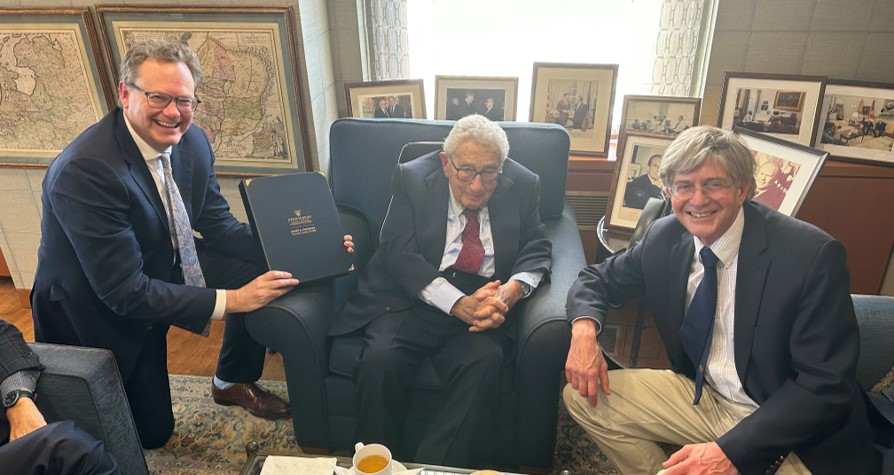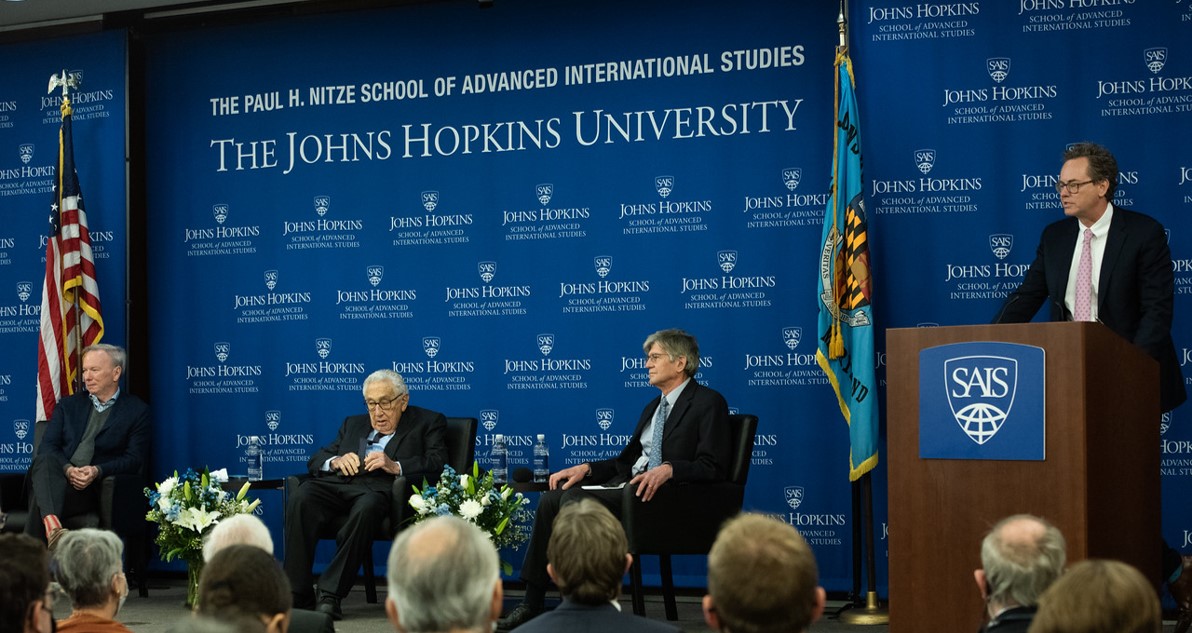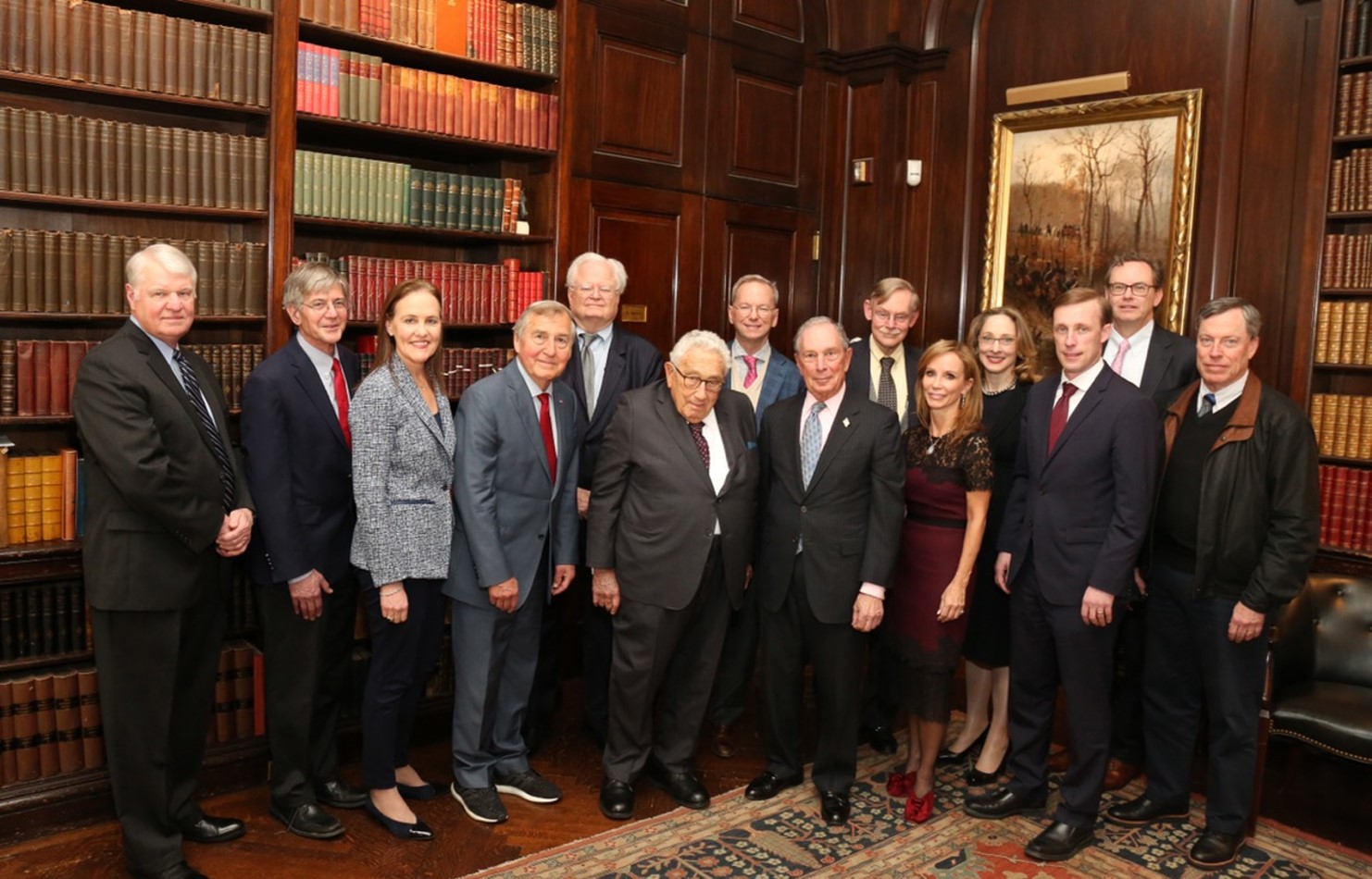The Johns Hopkins School of Advanced International Studies (SAIS) and the Henry A. Kissinger Center for Global Affairs mourn the passing of Dr. Henry Kissinger.
Born in Fürth, Germany in 1923, Henry Kissinger fled Nazi Germany with his family in 1938 and moved to New York City. He served in the U.S. Army in Europe during the Second World War and was awarded a Bronze Star. After completing his undergraduate degree and PhD at Harvard University, Kissinger embarked on an extraordinary scholarly career, writing on subjects ranging from the Congress of Vienna to the revolutionary role of thermonuclear weapons on world politics. He consulted for both the John F. Kennedy and Lyndon B. Johnson administrations before being named National Security Advisor and then Secretary of State for President Richard M. Nixon, a role he continued for President Gerald Ford. After his time in office, he started Kissinger Associates while publishing many important books, including White House Years, Diplomacy, On China, World Order and Leadership: Six Studies in World Strategy. He was widely sought after by global leaders and American presidents for his advice and counsel, and actively shaped debates on world affairs into his 100th year. For his many contributions to public service and scholarship, Kissinger is widely considered one of the most consequential statesmen in American history.
Johns Hopkins University (JHU) created The Henry A. Kissinger Center for Global Affairs at SAIS in 2016 to promote the serious study and practice of historically informed statecraft and strategy, which characterized Kissinger’s remarkable career as a policymaker and scholar. Dr. Kissinger avidly supported both the Kissinger Center and SAIS’ mission of generating innovative research that spoke to the world’s most pressing problems while training the next generation of national and global leaders. At the launch of the Kissinger Center, JHU President Ronald Daniels captured Dr. Kissinger's legacy and the ambitious aims of the center named in his honor, saying: “This center is named for a scholar-practitioner known for his strategic acumen, his preternatural ability to think fifteen moves ahead in any international negotiation, and his deftness in mining history for insights that foretell future action on the world stage. So many were drawn not only to honoring his legacy, but also, in doing so, to building the scaffolding to reset the way we understand geostrategy and teach the practice of statecraft for the 21st Century and beyond.”
Dr. Kissinger pioneered the application of historical lessons to current and future policy. This legacy is reflected in the Center’s flagship course, the Kissinger Seminar in Statecraft and Strategy, taught by SAIS Dean James Steinberg, Gavin, and Kissinger Distinguished Professor Hal Brands. Dr. Kissinger “virtually” met with the students each year, a highlight of the course, to share his vision of America’s vital role in a changing world while answering questions about his life and career.
With Dr. Kissinger’s enthusiastic encouragement and the support of the Ax:son Johnson Foundation for Public Benefit, the Kissinger Center published a revised edition of his celebrated undergraduate thesis, The Meaning of History: Reflections on Spengler, Toynbee, and Kant, including a new preface written by Dr. Kissinger and circulated to the world’s leading universities and libraries.
Dr. Kissinger also chaired the Center’s America and the Future of World Order Program, an effort to craft innovative and effective grand strategies for the United States in the face of a complex and rapidly changing world order. As part of this program, Dr. Kissinger presided over a small working group that included Michael Bloomberg, Eric Schmidt, current National Security Advisor Jake Sullivan and current director of the Central Intelligence Agency, William Burns, amongst other distinguished scholars and practitioners. These meetings emulated the famed gathering on world order held at Bellagio, Italy, in 1965, which Dr. Kissinger believed was formative to his thinking on foreign policy and international politics.
For more on Dr. Kissinger’s remarkable life and legacy, see https://www.henryakissinger.com/.
Dean Steinberg and Director Gavin’s visit with Dr. Kissinger in May 2023 
Dr. Kissinger and Dr. Schmidt at the launch of their book The Age of AI at SAIS in December 2021
A meeting of the America and the Future of World Order Program in 2019